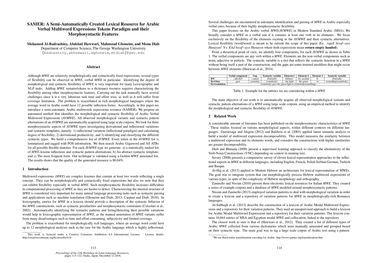SAMER: A Semi-Automatically Created Lexical Resource for Arabic Verbal Multiword Expressions Tokens Paradigm and their Morphosyntactic Features
Although MWE are relatively morphologically and syntactically fixed expressions, several types of flexibility can be observed in MWE, verbal MWE in particular. Identifying the degree of morphological and syntactic flexibility of MWE is very important for many Lexicographic and NLP tasks. Adding MWE variants/tokens to a dictionary resource requires characterizing the flexibility among other morphosyntactic features. Carrying out the task manually faces several challenges since it is a very laborious task time and effort wise, as well as it will suffer from coverage limitation. The problem is exacerbated in rich morphological languages where the average word in Arabic could have 12 possible inflection forms. Accordingly, in this paper we introduce a semi-automatic Arabic multiwords expressions resource (SAMER). We propose an automated method that identifies the morphological and syntactic flexibility of Arabic Verbal Multiword Expressions (AVMWE). All observed morphological variants and syntactic pattern alternations of an AVMWE are automatically acquired using large scale corpora. We look for three morphosyntactic aspects of AVMWE types investigating derivational and inflectional variations and syntactic templates, namely: 1) inflectional variation (inflectional paradigm) and calculating degree of flexibility; 2) derivational productivity; and 3) identifying and classifying the different syntactic types. We build a comprehensive list of AVMWE. Every token in the AVMWE list is lemmatized and tagged with POS information. We then search Arabic Gigaword and All ATBs for all possible flexible matches. For each AVMWE type we generate: a) a statistically ranked list of MWE-lexeme inflections and syntactic pattern alternations; b) An abstract syntactic template; and c) The most frequent form. Our technique is validated using a Golden MWE annotated list. The results shows that the quality of the generated resource is 80.04{\%}.
PDF Abstract

